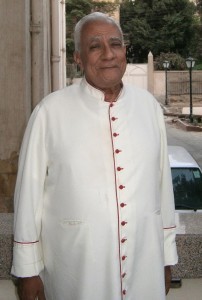
Bishop Adel Zaki of Alexandria, Egypt’s vicar for Latin-rite Catholics, is pictured at his residence in Cairo Sept. 13. Bishop Zaki said events that occur in Western countries often affect the Middle East’s Christians.
CNS photo/James Martone
CAIRO (CNS) — As tear-gas bearing police battled Egyptians armed with stones in front of Cairo’s U.S. Embassy, Rashad was two neighborhoods away, making sure the few evening costumers respected the line at the Mobinil cellphone company where he works.
“Is it all right to defame the Prophet, blessings be upon him?” Rashad, a Muslim, asked a reporter who inquired about the embassy standoff. “No. There are limits to how far people should be allowed to go,” he said after a slight pause, in answer to his own question.
Rashad, who would not give his last name, had not seen the amateur film reportedly defaming the prophet Mohammed that led to protests at the U.S. embassies in Egypt and other countries. But he said he’d heard enough to know that the film produced in the U.S. was “haram,” or sinful, and that protests against it — however violent — were justified.
Such anger over the U.S.-produced film that depicted Mohammed as a sex-crazed simpleton has Egypt’s Christians — and others in predominantly Muslim countries — worried. They say the film’s association with the Christian West makes them possible targets of extremist behavior.
“What happens outside the country is very dangerous for us because it is perceived to be related to us inside,” said Bishop Adel Zaki of Alexandria, Egypt’s vicar for Latin-rite Catholics.
The film was released in July but went almost completely unnoticed in the Middle East until a preview of it was translated into Arabic.
In an interview at his Cairo residence, Bishop Zaki told Catholic News Service that Egypt’s Catholics condemned defamation of other religions, in line with what he called “the Vatican decree which commands respect for those of other faiths.” But when products or policies deemed anti-Arab or anti-Muslim surface in the U.S. and in other Western countries, Egypt’s Christians, who account for about 8 million of the country’s more than 82 million people, often feel the brunt, he said.
People in other countries “should keep in mind that there are repercussions for Christians here. The level of fanaticism grows,” he said.
Newly elected Egyptian President Mohammed Morsi, a conservative Muslim, has decried the short film, saying “Egyptians reject any kind of insult against our Prophet,” but he also called for restraint and protection of the country’s “foreign guests” and embassies.
Despite the tension over the film in Cairo and other parts of the Middle East, Father Fady Sady, a Coptic Catholic priest, said he did not expect trouble in Egypt’s South, where he lives and serves.
“(Muslims) know those who made the film are not from Egypt, so there will be no problems,” he said by cell phone from the city of Nagada. But he added that “when anything contentious” like this film appears abroad, Christians in Egypt go on alert.
“Perhaps someone not very educated could use the event to make an operation,” he said, referring to attacks on churches that have occurred in the past.
Back in Cairo, Mohammed Abdu, a 22-year-old Muslim taxi driver, said he was angered by reports of the film but even more upset by the protests at the U.S. Embassy. He said he expected they would further damage Egypt’s economy, already facing huge challenges due to dramatic losses in tourism and other business since the 2011 overthrow of former President Hosni Mubarak’s authoritarian regime.
“Had (the protesters) been quiet and ignored (the film), it would have disappeared, but now it is famous. When people start climbing walls and attacking embassies, the people who made the film get the attention they wanted,” said Abdu, who drives a rented cab 12 hours a day to save enough money to get married. He said he projected even less income for the country now and, consequently, fewer people with money to ride cabs like his.
Internationally, religious leaders from across the spectrum were quick to condemn the hate message of the anti-Islam film and the wave of violent attack it supposedly provoked. In a Sept. 11 attack, the U.S. ambassador to Libya, three other Americans and several Libyan soldiers were killed in the consulate in Benghazi, Libya.
The next day, the Vatican condemned the attacks, saying there was no justification for such violence.
Bishop Gerald F. Kicanas of Tucson, Ariz., chairman of the board of Catholic Relief Services, the U.S. bishops’ overseas relief and development agency, told Catholic News Service Sept. 12 that such situations are reminders that “we need to understand what faith groups hold dear,” and that violence in the name of faith is not in keeping with the teachings of Islam, Christianity or other religions.
After protests in Pakistan gathered momentum, Catholic leaders in Faisalabad condemned the film. A church official said leaders hoped to avoid possible anti-Christian backlash.
Israeli and Palestinian leaders who work with religious institutions as well as heads of local churches issued a joint statement Sept. 15 deploring “those who abuse free speech to offend the religion and religious beliefs and symbols of others.”
The leaders also condemned “those who use violence in reaction instead of peacefully protesting against such abuse.”
Israeli Deputy Foreign Ministry spokesman Paul Hirschson told the Hebrew edition of Ha’aretz daily newspaper that the content of the film was “beneath contempt” and “vile.”
Leaders of the Coptic Orthodox Archdiocese of North America expressed sympathy to the families of those killed in Libya and emphasized that such violence contradicted “the virtues of love and tolerance by which Christians are governed.” They also rejected allegations that the Coptic Orthodox community was involved in producing the film.
